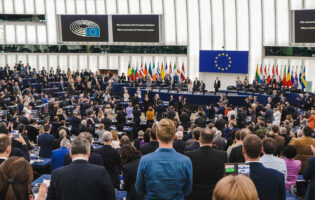Resetting Transatlantic Trade Negotiations
By DAAD/AGI Fellow Tilman Krueger
Underlying past failures to agree on transatlantic trade liberalization are strong vested interests in the U.S. and in the EU—issues that have not vanished over the years. For negotiations on the recently proposed Transatlantic Trade and Investment Partnership (TTIP) to become successful, greater engagement with such interests is needed to achieve more than yet another failure. Furthermore, instead of convincing those peers that are already aware of the value of greater transatlantic economic convergence and hailing the TTIP on the basis of more or less diffuse expectations about the benefits of a still-to-be-known negotiation package, supporters of a TTIP should refocus their initiative on issues that are known but that remain unresolved.
It is true that stimulating economic growth at significantly lower material and political costs than those needed to agree on stimulus packages and/or the loosening of austerity measures is attractive on both sides of the Atlantic. However, with both U.S. and EU negotiators still in the phase of securing their respective negotiating mandates, it is not a bad thing to also stress the many obstacles towards actually agreeing on a comprehensive package. Indeed, drawing on lessons learned from past initiatives, there are not many promising signs: political gridlock in the World Trade Organization (WTO) and subsequent lack of progress in multilateral negotiations; failed past attempts of the U.S. and the EU to move ahead alone; major trade disputes between the two on important issues; and lack of political engagement among leaders on both sides of the Atlantic to move ahead.
In a report that triggered the joint initiative of U.S. and EU leaders to launch negotiations, the U.S.-EU High Level Working Group on Jobs and Growth promises that they will work, among other things, towards an “ambitious ‘SPS-plus’ chapter”. As with any other part of the negotiation package, the exact contents are still unknown; the report only provides an overall framework for future negotiations. However, Max Baucus, chairman of the powerful Senate Finance Committee, has already raised the bar rather high for Congressional approval to any negotiation results. Alluding to the preconditions for Congressional support to the envisioned “ambitious, comprehensive, and high-standard TTIP”, Baucus, in his capacity “as a senator from a large agricultural state,” wrote in an article for the Financial Times: “Congress will not settle for an agreement that fails to address the areas likely to yield some of the most significant economic gains—in particular, the elimination of barriers to agricultural trade and ensuring that regulatory processes are streamlined and based on sound science.”
For everyone who has been following transatlantic trade relations in the past decades, including the WTO disputes on hormone-treated beef and genetically modified organisms, this is exactly where it gets interesting—and difficult. Baucus’ remarks suggest that negotiators will have to balance different philosophies towards important regulatory issues. In the area just mentioned, and just like in the WTO disputes, the U.S.’ sound science approach will have to compete with the EU’s precautionary principle. Yet, just like following the WTO disputes, it is difficult to imagine a solution on these issues: while the U.S. won both disputes on their legal claims, the EU found it impossible to comply. As if to prove the point, the European Parliament stated late last week that “U.S.-EU differences over GMOs, cloning and consumer health must not undermine the EU ‘precautionary principle’.” The European Parliament also demanded the exclusion of “cultural and audiovisual services, including on-line ones” from the negotiating mandate. This latter demand reflects a French threat to block even the start of any negotiations, should there be no “cultural exception.”
Regulatory issues are thus only one example for the strong vested interests that persist in the U.S. and in the EU. For negotiators, a solution could be, of course, to agree on progress in some areas and to leave untouched other, more politically contentious areas. They could engage in some housekeeping and remove, for instance, remaining tariff barriers to trade or streamline divergent investment regulations. At the same time, they could avoid too much noise around sensitive areas, which exist on both sides of the Atlantic. Baucus’ comments show, however, that avoiding certain issues may lead to a situation in which Congressional support will be difficult to secure.
A good strategy might thus be to engage more directly with those domestic interests in the U.S. and Europe that have caused the failures of past attempts to boost transatlantic trade relations. Instead of constantly reassuring others and themselves that this is finally the right time to start trade negotiations, TTIP supporters should start tackling reflexive domestic opposition. If there is real political will on both sides of the Atlantic, as many appear to believe, this may be the right time to try and get rid of some of the stumbling blocks in the way of vital transatlantic and, in fact, international trade relations.
Mr. Krueger was recently quoted on the issue of TTIP in Handelsblatt:
Freihandelsgespraeche ohne Tabus, Astrid Doerner, Handelsblatt (May 22, 2013)










